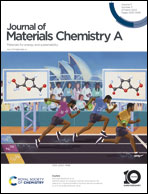Predicting lattice thermal conductivity from fundamental material properties using machine learning techniques†
Abstract
High-throughput screening and material informatics have shown a great power in the discovery of novel materials, including batteries, high entropy alloys, and photocatalysts. However, the lattice thermal conductivity (κ) oriented high-throughput screening of advanced thermal materials is still limited to the intensive use of first principles calculations, which is inapplicable to fast, robust, and large-scale material screening due to the unbearable computational cost demanding. In this study, 15 machine learning algorithms are utilized for fast and accurate κ prediction from basic physical and chemical properties of materials. The well-trained models successfully capture the inherent correlation between these fundamental material properties and κ for different types of materials. Moreover, deep learning combined with a semi-supervised technique shows the capability of accurately predicting diverse κ values spanning 4 orders of magnitude, especially the power of extrapolative prediction on 3716 new materials. The developed models provide a powerful tool for large-scale advanced thermal functional materials screening with targeted thermal transport properties.



 Please wait while we load your content...
Please wait while we load your content...
